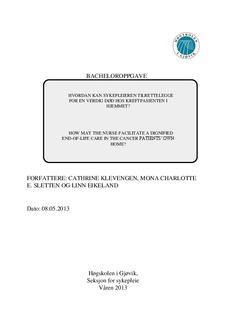Hvordan kan sykepleieren tilrettelegge for en verdig død hos kreftpasienten i hjemmet?
Bachelor thesis
Permanent lenke
http://hdl.handle.net/11250/142857Utgivelsesdato
2013Metadata
Vis full innførselSamlinger
Sammendrag
NORSK: Innledning: Antallet palliative kreftpasienter øker stadig. Mange av disse ønsker å dø hjemme.
Siden samhandlingsreformen i tillegg sier at kommunen skal være i stand til å yte pleie til denne
pasientgruppen hjemme, fokuserer denne studien på hjemmesykepleien.
Hensikt: Studien undersøker hvordan sykepleieren kan tilrettelegge for en verdig død hos
kreftpasienten i hjemmet.
Metode: Denne studien har brukt litteraturstudium som metode. Vi har brukt søkeordene dignity,
terminal care, cancer, home care service, at home og nurs* i databasene Cinahl og Ovid Nursing.
Resultat: Smerte- og symptomlindring, samhandling med pårørende, kommunikasjon, kunnskap og
kompetanse, tverrfaglig samarbeid og tilgjengelighet, er sentrale faktorer for en god hjemmedød.
Konklusjon: For at kreftpasienten skal kunne oppleve en verdig død i hjemmet, er det nødvendig
med kompetanseheving i kommunene. God samhandling med pasient, pårørende og andre
yrkesgrupper er avgjørende. Helsetjenesten må være tilgjengelig, og sykepleier må våge å ta opp
eksistensielle spørsmål. ENGLISH: Introduction: The number of patients with palliative cancer is increasing. Many of them wish to die
at home. Since The Norwegian Coordination Reform claims that the municipality shall be able to
provide proper care for these patients in their own homes. Therefore, this study will focus on the
home care service.
Aim: This study investigates how the nurse may facilitate a dignified end-of-life care in the cancer
patients’ own home.
Method: We performed a literature search using Cinahl and Ovid Nursing databases. We applied
search words like dignity, terminal care, cancer, home care service, at home and nurs*.
Results: Key factors of a good death in the patients’ home are pain- and symptom management,
interaction with the family, communication, knowledge and competence, interdisciplinary
collaboration and accessibility.
Conclusion: In order for the terminally ill cancer patient to experience a dignified end-of-life care
at home, it is a need for increased competence in the municipalities. A good interaction between
the nurse and the patient, his relatives as well as other professions, is decisive. The health care
service needs to be accessible, and the nurse must have the courage to approach existential
questions.
